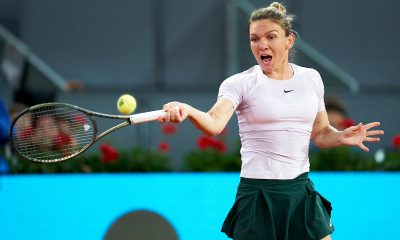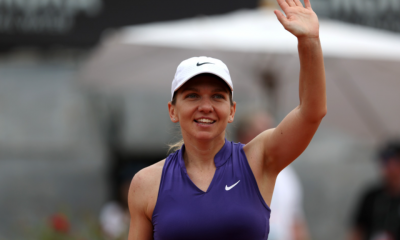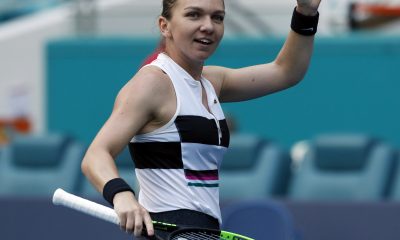TENNIS 2014 ROLAND GARROS – 7th of June. M. Sharapova d. S. Halep 6-4, 6-7, 6-4. An interview with Maria Sharapova
Q. Congratulations, Maria.
MARIA SHARAPOVA: Thank you.
Q. How do you find the keys to change the match in the hard moments for you? You always do that.
MARIA SHARAPOVA: There were a lot of different keys and there were a lot of ups and downs in the match.
Just when I thought I was very close to winning it, I had lost four points in a row. Then the match becomes equal. Then you find yourself in a position where you feel like you’re starting over, which is quite difficult.
I just took a moment to reflect and try to think of the things that I was doing to hurt her and the things that were giving me an advantage in the game.
I knew that she was playing well, and despite all that despite that it was a very physical match, I still wanted to continue to try to do those things well no matter how frustrating it was to lose that second set.
I came out well. We broke each other a few times. That’s the story.
Q. This was the tournament that took you, of the four Grand Slams, the longest to win, and now you have won it twice. Do you have any thoughts of why it’s happened that way?
MARIA SHARAPOVA: I’m with you on that one. I didn’t actually I didn’t think if somebody had told me that I’d win at some stage in my career that I’d have more Roland Garros titles than any other Grand Slam, I’d probably go get drunk (Laughter.) Or tell them to get drunk, one or the other.
Yeah, it’s really amazing. I feel that I worked to get to this position. There’s nothing else. There is no substitute in these titles. You can’t just go out there and just do it without putting in the effort, putting in the work.
You’re not just born being a natural clay court player. Okay, maybe if you’re Nadal. But certainly not me. I didn’t grow up on it; didn’t play on it. I just took it upon myself to make myself better on it.
There is no one else that was going to do that for me. I had to do the work.
Q. You have talked a lot about your team the last couple weeks. You had those great moments on the court today. You took a lot of care to build that team. Can you talk a little bit about how they brought you to this moment?
MARIA SHARAPOVA: Yeah, every single one of my team members have done an incredible job. Some are new; some have been there for a while.
They have just been so encouraging. I have been through a few different teams in my career, many different people, some coaches, physios, trainers. I have said this from I think the offseason I had never been more happy with the way that everyone has worked together.
No matter the situation, no matter how tough it was (mobile phone interruption).
Nice song. (Laughter.)
We had really tough moments and so many questions. Last year at the end of the year I was traveling around Europe, trying to find a solution to getting my shoulder better. I didn’t have a coach at the time.
When we all got together and little by little started working together I no, I realized that there was really good energy, and it just felt so different to not that anyone it’s like everyone worked together, and this is such a huge piece of the puzzle as a professional athlete. You are the one competing, but the team atmosphere is so important.
You know, the voices that are constantly there for you from is a Sven to even role as a hitting partner, someone who has been with me a couple of years already. My fitness coach has been there for years and has helped me tremendously on the surface.
A new physio that just spends hours and hours trying to work through new ways to get my shoulder stronger and better on the massage table. They work so hard, and I really respect that.
Q. You’re the first Russian who wins twice the same slam, men and woman. I’d like to know, what are you more proud of and what do you remember of the other slams? Because of course Wimbledon was the first, but this has been the biggest fight. All the other finals you won in two sets. The is only one you won in three. It’s also 20 wins in a row on clay when you get to the third set.
MARIA SHARAPOVA: It’s the most emotional victory for me. The toughest one physically that I’ve come across in a final, especially a Grand Slam. There is not too many finals that you get past three hours.
With all that said, you know, to look back seven or eight years and to think that I would be in that position, I would come through against an opponent that makes you play and hit and run and hits so many shots and recover in conditions that start from cold to being warm today. So much adversity is thrown at you, and I’m just proud I came through and I adjusted in all different situations and I end up with this (Pointing to trophy.) (Smiling).
Q. You declared after the match it was the toughest final of Grand Slam.
MARIA SHARAPOVA: Uh huh.
Q. What did you think about your opponent today?
MARIA SHARAPOVA: Well, I think you saw the level and the quality of tennis that she’s able to produce and has been playing with throughout this whole tournament and this whole year. She certainly deserved to be at this stage. She pushed me to the limit today.
Yeah, I mean, she’s been extremely consistent. She’s going to be 3 in the world now. I think her results speak for themselves. There is a reason why she was out there today and had a huge chance to win.
Q. There was a warning in the second set. How conscious were you of how long you were taking to serve? How much is that a reflection how much pressure Simona was putting on you during the game?
MARIA SHARAPOVA: Yeah, I think the rules are a bit different at the Grand Slams, and I just feel like I might have to speed it up a bit at these tournaments than other tournaments because the rule is a bit different.
Q. I think this tournament was probably one of the toughest women’s tournaments in recent times. Some very, very close fought matches. A few youngsters have come through. Can you talk to us about the state of the women’s game and how good you think it is now?
MARIA SHARAPOVA: Yeah, I mean, it’s interesting when the draw comes out. Everyone is in there. It’s a mixture of, you know, older generation, newer generation, and some people that are somewhere in the middle probably, like me.
You know, there is always the favorites. There is always the underdogs. There’s always the young ones that people are looking towards and believe will be the rising stars.
I think this tournament has proven to be that. There were some upsets in the beginning. I know from the beginning of the tournament everyone came in my press conference, and the first thing they said, Well, you’re going to be facing Serena in the quarterfinals. What a tough draw. What bad luck you have. We haven’t even played the first round yet.
So from that tough luck in the draw to being the French Open champion is a very nice feeling. That’s why I say when the draw comes out, nothing is set in stone. We still have to go out there and play our matches.
But I think you’ve seen a lot of different matches. For me, it’s been a very physical tournament, one of the most physical Grand Slams I have ever played.


 Hot Topics3 days ago
Hot Topics3 days ago
 Latest news3 days ago
Latest news3 days ago
 Hot Topics2 days ago
Hot Topics2 days ago
 Hot Topics3 days ago
Hot Topics3 days ago
 Focus2 days ago
Focus2 days ago
 Focus2 days ago
Focus2 days ago
 Focus2 days ago
Focus2 days ago
 Hot Topics2 days ago
Hot Topics2 days ago
























